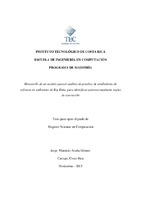Desarrollo de un modelo para el análisis de pruebas de rendimiento de software en ambientes de Big Data, para identificar patrones mediante reglas de asociación.
Resumen
The application development process considers several stages or phases in the product life
cycle, there are different variations of the kind of the stages the lilfe cycle should follow,
but the testing phase is always present. In a testing stage, the decision if the application
goes live or not is made.
In this phase, the application and its new capabilities or functionalities are tested, in order
to guarantee it is working properly and as expected. There are different kind of tests,
among them, the functional and performance testing. Functional testing is in charge of
validating that all the processes developed are producing the correct output, it means that
everything is working as expected. In the other hand, the performace testing ensures that
the application performance is optimal, that means the system can process and attend all the
user or application requests without any complication.
The performance testing has as main objective to demonstrate that the hardware and
software work properly together, according to the loads like concurrent processes or users
in production environments. Because of that, this kind of testing is so important. Applying
performance testing, allows the development teams to identify potenctial interruptions or
future failures in production systems.
The analysis and evaluation of the obtained results from this kind of testing can be tedious
and complex, requiring the investment of time, money and human resources. For this
reason, it is important to conduct studies on how to improve the involved processes in the
analysis of these results.
The present study proposes and develops a model, that using data mining techniques such
as the generation of association rules, presents a series of standards and steps that must be
met, to facilitate development teams the analysis and evaluation of the results.
The model, also, presents another significant challenge, and it is that currently we must
address the data processing more closely, as we face a huge amount of data with complex
structure and different kind of formats. It is for this reason that one of the objectives of this
work is to take advantage of the available options for Big Data today.
In this way, using the model and attacking the identified challenges, the decisions can be
made more efficiently and effective.
Descripción
Proyecto de Graduación (Maestría en Computación) Instituto Tecnológico de Costa Rica, Escuela de Ingeniería en Computación, 2015.
Compartir
Métricas
Colecciones
- Maestría en Computación [113]


